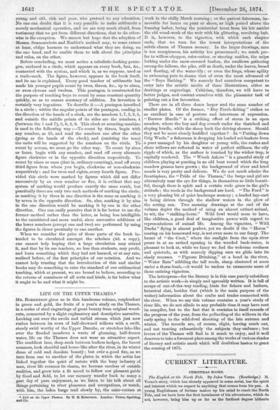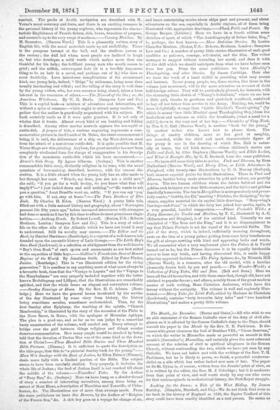CURRENT LITERATURE.
CHRISTMAS BOOKS.
The English at the North Pole. By Jules Verne. (Routledge.) M. Verne's story, which has already appeared in some serial, has the spirit and interest which we expect in anything that comes from his pen. A young Englishman of fortune makes up his mind to reach the North Pole, and we have here the first instalment of his adventures, which do not, however, bring him up as far as the furthest degree hitherto reached. The perils of Arctic navigation are described with M. Verne's usual accuracy and force, and there is an exciting romance in the personal history of the young explorer, who represents the charac- teristic Englishman of French fiction, rich, brave, tenacious of purpose, and eccentric up to the very verge of madness.—Country Maidens. By M. Bramston. (Marcus Ward.) This is a pleasantly written story of English life, with the usual materials made up not unskilfully. There is the pompous baronet at the hall, and the studious parson at the rectory ; the dull lad whom most people are inclined to laugh at, but who developes a solid worth which makes more than one thankful for his help; the brilliant young man who nearly comes to grief; and the selfish, extravagant heir (it is a terribly dangerous thing to be an heir in a novel, and perhaps out of its) who does so most decidedly. Love introduces complications of the accustomed kind, one young lady, indeed, " Midge " by nickname, being more than usually fascinating and wilful ; and the telling of the story is well done by the young widow, who, her own romance being closed, takes a keen interest in the romances of others.—The Nimrod of the Sea; or, the American Whaleman. By W. M. Davis. (Sampson Low and Co.) This is a capital book—a mixture of adventure and information, not without a spice of romance—which ought to attract many readers. We gather that the author is practically acquainted with his subject. His book certainly reads as if it were quite genuine. It is not only of whales that it treats. Almost every kind of sea hunting and fishing is described. Among other marine marvels appears the sea-squid or outtle-fish. Apropos of this, a curious engraving represents a com- memorative picture in the Church of St. Melee, the event commemorated being, it is said, the deliverance of a ship on the West-African coast from the attack of a monstrous cuttle-fish. It is quite possible that M. Victor Hugo saw this painting. Anyhow, the great novelist has now been completely vindicated from the charge of exaggeration in his descrip- tion of the monstrous cattle-fish which his hero encountered.— Drusie's Oen Story. By Agnes Giberne. (Seeleys.) This is another commendable little story, distinctly religious in its tone, with the usual quantum of love-makiag, described. however, with the utmost dis- cretion. It is a little absurd when the young lady has an offer made to her through her aunt. " Drusie, my dear, you are not a child now," she said ; "if you go for a walk to-day, do you know what that will imply?"—" 1 just looked down and said nothing."—" He wants to ask you a question," Aunt Drusilla went on, softly. "If you can say ' yes,' go with him. If not, stay at home."—s--The Twin Brothers of Else Dale. By Charles H. Eden. (Marcus Ward.) A pretty little tale, filled out with a little natural history and geography, about "Norwegian peasant life fifty years ago," before increased intercourse with strangers had done so much as it has by this time to efface its most prominent singu- larities.—Anthony Brade. By Robert Lowell. (Boston, U.S.: Roberts Brothers. London : Sampson Low and Co.) This is a story of school life on the other side of the Atlantic which we have not found it easy to understand. Still its novelty may amuse.—The Billow and the Rock, by Harriet Martineau (Routledge), is a reprint of a well-known tale founded upon the romantic history of Lady Grange.—The Little Boy's Own Book (Lockwood) is a selection or abridgment from tho well-known "Boy's Own Book" of such sports and amusements as are beet suited to the capacities of little boys.—Gulliver's Travels into Several Remote Regions of the World. By Jonathan Swift. Edited by Peter Pinder, Junior. (Routledge.) This is "an illustrated edition for the rising generation." It is needless to say anything more of what must always be a favourite book, than that the "Voyage to Laputa " and the " Voyage to the Houyhnhmns " are very properly included together with the better known Brobdinguag and Lilliput, that the illustrations are remarkably spirited, and that the whole forms an elegant and convenient volume.
Sunday Evenings at Home. By the Rev. H. 0. Adams. (Rout- ledge.) Here we have the general lesson inculcated by the service of the day illustrated by some story from history, the history being sometimes secular, sometimes ecclesiastical. Thus, for the first Sunday after Epiphany, the teaching of the epistle, "Church Membership," is illustrated by the story of the secession of the Plebs to the Mons Sacor, in Rome, with the apologue of Menenius Agrippa. The plan is a good one, and as far as we can judge by a somewhat hasty examination of the volume, well carried out. Every attempt to bridge over the gulf between things religious and thinga secular deserves commendation. How many people would be shocked by being told that the devotion of Decius Mus was of the same kind as the devo- tion of Christ 1—Three Hundred Bible Stories and Three Hundred Bible Pictures. (Nimmo.) It is sufficient to quote the description on the title-page, that this is "a pictorial Sunday book for the young."
More Wet Sundays with the Book of Joshua, by Ellen Palmer (Nimmo), deals more fully with a limited portion of the Bible. The subject seems to have 'been carefully studied. Very properly, it includes the whole life of Joshua ; the book of Joshua itself is not reached till about the middle of the volume.—Travellers' Tales. By the Author of " Busy Bee," &c. (Seeleys.) Here wa have bung on a slender thread of story a number of interesting narratives, among them being an ascent of Mont Blanc, a description of Mauritius and Teneriffe, of Chim- borazo, &c. The illustrations are of more than average merit. From the same publishers we have Sea Breezes, by the Author of " Knights of the Frozen Sea," &c. A sick boy goes on a voyage for change of air, and hears entertaining stories about ships past and present, and about adventures on the sea, especially in Arctic regions, all of them being illustrated with appropriate drawings.—Flood, Fiell, and Forest. By George Rooper. (Isbister.) Here we have in a fourth edition some sketches of sport, of which "The Autobiography of Salmo Saler, Esq.." is, perhaps, the best known.—More Bed-time Stories. By Louise Chandler Moulton. (Boston, U.S.: Roberts, Brothers. London : Sampson Low and Co.) A number of pretty little stories illustrative of such good qualities as patience, courage, self-denial, and the like. The writer manages to suggest without intruding her moral, and does it with all the skill which we should anticipate from what we have before seen from her pen. From the same publishers we have Mischief's Thanksgiving, and other Stories. By Susan Carbidge. Here also we have the work of a hand skilhil in providing what may amuse and instruct. To our young people, too, those stories, like those in the volume just mentioned, will be the more attractive on account of their half-foreign colour. They will ho particularly pleased, for instande, with the charming little sketch of "Nanny's Substitute," where we see how a little girl, thanks to goodness and good-luck combined, contrived to buy off her father from service in the Army. Nothing, too, could bo more delightfully strange than "Little Mischief's Thanksgiving" (by which is meant ' how little Mischief spent Thanksgiving Day,) from the buckwheat and molasses on which she breakfasts, (what a meal for a child !) down to the very end of her clay.—Chronicles of Cosy Nook, by Mrs. S..C. Hall (Marcus Ward), is another "book for the young," by another writer who knows how to please them. Tho doings of sundry children, more or less good or naughty, are recorded, while the chief and most characteristic figure of the group is one in the drawing of which Mrs. Hall is natur- ally at home, the old Irish nurse.—Other children's stories are Pollie and Jack, by Alice Hepburn (Marcus Ward); and Ella's Locket, and What it Brought Her, by G. E. Hartnett, from the same publisher. —We have still some fairy tales to notice. Puck and Blossom, by Rosa Mulholland (Marcus Ward), and Merry Elves, or Little Adventures in Fairyland, with twenty-four illustrations by C. 0. Murray (Seeleys), both deserve especial praise for their illustrations. Those in Puck and Blossom, besides being made attractive by gold and colour, are prettily drawn. The two human children whom the fairies befriend and the goblins seek to injure are dear little creatures, and the fairies and goblins fancifully humorous. The fun in MerryElves is more genuinely and power- fully comic; " Gobble, the Elf," meeting Prickles, the Hedgehog," for in- stance, supplies material for six capital little drawings. "Rosy-wing's Oarriage-and-Four," to which the fairy has yoked four moths, again, is a very graceful, fanciful composition.—Prince Perindo's Wish ; a Fairy Romance for Youths and Maidens, by T. C., illustrated by A. O. (Edmonston and Douglas), is of the satirical kind. Naturally we are reminded of " The Rose and the Ring," and it is no disparagement to say that Prince Perindo is not the equal of the immortal Bulbo. The plot of the story, which is, indeed, sufficiently amusing throughout, rests on the idea of a young prince getting from some fairy benefactress the gift of always meeting with kind and approving looks and words. We all remember what a very unpleasant place the Pala is de la Verite turned out to be, but the Prince discovers it to be equally intolerable never to hear any truth, and having discovered this, is made happy after the approved fashion.—The Fairy Spinner, etc., by Miranda Hill (Marcus Ward), is a romance, after the old model, with a heroine pleasantly drawn both by pen and ponciL—The Wonder-World; a Collection of Fairy Tales, Old and New. (Bell and Sons.) Hero we have all the old favourites, and with them some that, though old, have not attained to popular favour ; and others, notably those of the great modern master of such writing, Hans Christian Andersen, which have the favour without the antiquity. The volume is well and copiously illus- trated.—Merry Tales for Little Folk, edited by Madame de Chatelain (Lockwood), contains "forty favourite fairy tales " and " two hundred illustrations," and makes a pretty little volume.



































 Previous page
Previous page